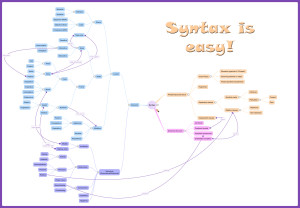Standing on Formality
I was raised on the King James Version of The Bible (the good ol’ KJV). In addition to its spiritual tutelage, this translation quite nicely… Read More »Standing on Formality
I was raised on the King James Version of The Bible (the good ol’ KJV). In addition to its spiritual tutelage, this translation quite nicely… Read More »Standing on Formality
We find one of the longest battles in English linguistic history in that simple, problematic word “ask.” You wouldn’t think that three small letters… Read More »When Someone Has an Axe to Grind
This post covers two essential constructs most commonly associated with the verb to be.
Objectives:
Skill Level: Intermediate
In English, the term “copula” (or “linking verb”) refers to a verb that links a subject and a subject predicate. (The subject predicate, as indicated by its name, takes a nominative case.) The copula serves as a sort of grammatical placeholder and holds little lexical meaning despite its grammatical and rhetorical purpose.
This post covers the verb features of Tense, Mood, and Aspect. It’s boring, and I’ve put off writing it forever because it’s boring.
Objectives:
Skill level: intermediate
“The past and the future walked into a bar. It was tense.”
As grammar jokes go, this one is fairly awful. (But I laugh all the same, of course, because my sense of humor apparently sprouted in one of our local corn fields.) Of the verb features, Tense is probably the easiest to understand. Mood, and Aspect were once these nebulous terms to me, conditions that I understood existed but that I couldn’t pinpoint or keep track of. A fourth verb feature, Voice, merits its own post and will be discussed only minimally here.
This post is the first in a series on Verbs. Dry, dry, horrifically essential stuff.
Objectives:
Skill Level: beginner
If the five lexical categories were Tolkien’s infamous rings, the Verb would be the One Ring to rule them all. For writers, it can make or break a narrative. A wrong verb or a wrong tense on a verb can skew your intended meaning and instantly derail your reader’s focus. It can also summon grammar-wraiths to hammer their shrieking condemnation down upon your head. (Man, how I wish I were only kidding about that.)
Thus, as writers, it behooves us to be well acquainted—and perhaps even intimate—with our friend and sometimes friendly nemesis, the Verb.
This post provides an overview of the Noun. Skill level: Beginner
Objectives:
I’d love to say that nouns are a self-explanatory category. I mean, we all know what a noun is, right? Or, we’ve heard the word and have a general idea, or… something. The purpose of this post is to codify that “something” into a more concrete understanding. If you know exactly what a noun is and can accomplish all of the above objectives already, then feel free to move along.
If not, or if you want a refresher, read on.

This posts covers an introduction to basic syntax. Skill level: Beginner.
For a definition of “syntax,” click here. (I could paraphrase, but I’d have to give credit anyway, so I might as well send you straight to the source.) Right, then. With that settled, let’s jump right in, shall we?
Linguistics: a term that makes many a writer cringe. While the study of this discipline might seem daunting, it can be a boon to the… Read More »Linguistics for Writers: An Introduction
So this might seem like a pretty harsh blanket statement, but honestly, there is no real need in the English language for this word. We already have “use,” which is shorter and expresses the same concept.
Read More »Words to Live By